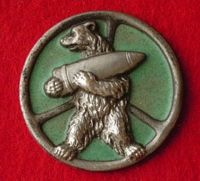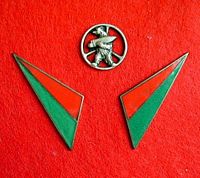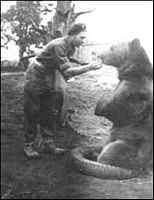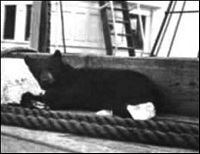Data: 27-09-2006
 Autore: VARI
Autore: VARI Liste: ARTICLES IN ENGLISH
Liste: ARTICLES IN ENGLISH Categorie: Spigolature
Categorie: Spigolature Tag: animali, polonia, wojtek
Tag: animali, polonia, wojtekTHE IRANIAN SOLDIER-BEAR OF MONTE CASSINO
by: Ryszard Antolak, August 2005.
After the Battle of Monte Cassino, one of the fiercest and bloodiest conflicts of the Second World War, many accounts emerged of the bravery and heroism of the soldiers. But perhaps the strangest story of all was of an Iranian brown bear who served alongside the allied soldiers in the worst heat of the battle. Despite the incessant bombardment and constant gunfire, the bear carried vital supplies of ammunition and food to his fellow-soldiers fighting on the mountainside. Many observers who witnessed his remarkable actions doubted the reality of what they were seeing. But the story was no legend.
At the time of his death in 1964, he was the most famous bear in the world, visited by countless celebrities and adored by the international press. Books and articles were written about him, statues and plaques commemorated his actions. To the men of the 22nd Transport Company (Artillery Supply) however, he was merely Voytek a remarkable fellow soldier, and their beloved comrade.
He was born in the mountains of Hamadan, in one of the many caves to be found in that dusty mountainous area. At the age of eight weeks his mother was killed by a group of hunters, but he was rescued by a young Iranian boy who thrust him into a hempen sack and set off with him homeward along a narrow dusty path.
Iran at that time was going through one of the unhappier periods of her history. Occupied by the Russians and the British, her relations with the soldiers of those two countries were understandably tense and strained. In April 1942, however, Iran opened its arms to receive hundreds of thousands of Polish citizens (men, women and children) who had been released from the Soviet labour camps of Siberia and Kazakhstan. Having arrived at the port of Pahlevi (now Bandar-e Anzali), they were suffering from various diseases, including malnutrition, and had to be rested in the vast tented city hastily built for them on the shores of the Caspian. When they were well enough to travel, however, they were taken to more substantial military and civilian resettlement camps all over Iran.
Most of the civilians (women and children) were destined to remain as guests of Iran for up to three years. But the able-bodied men were almost immediately sent westwards to join the Polish forces in Lebanon. A long stream of covered trucks left Anzali daily carrying the future soldiers along the narrow twisted roads via Qazvin, Hamadan and Kermanshah to the borders of Iraq and beyond.
It was on one of the narrow mountain roads somewhere between Hamadan and Kangavar, that the trucks were brought to an abrupt halt by the sight of a small Iranian boy carrying a bulky sack. He looked tired and hungry, so the men offered him a billy-can of meat. And as he ate, they gasped in astonishment as the sack beside him began to move and the head of a honey-coloured bear cub emerged sleepily into the sunlight.
Although none of the men could understand Farsi, the boy was able to indicate by his actions that he had found the bear cub whimpering outside one of the caves, its mother having been shot by a hunter. The orphaned cub was in poor condition and it was almost certain he would not survive the day. One of the men, therefore, offered to buy the orphaned cub for a few toumans. Someone else fumbled for a bar of chocolate and a tin of corned beef to give him. Another took from his pocket an army penknife that opened up like a flower. The boy smiled, pocketed the offerings and disappeared forever from their lives.
A feeding bottle had to be hastily improvised from an empty bottle of vodka into which a handkerchief had been stuffed to serve as a teat. They filled it with condensed milk, diluted it with a little water, and gave it to the little bear to drink. When he had finished it, he crept up close to one of the soldiers for warmth and fell asleep on his chest. The soldier s name was Piotr (Peter) and he became forever afterward, the bear s closest and most enduring friend.
The cub clung desperately to his substitute mother all through the tortured journey across Persia, Iraq and Jordan, along vast distances that seemed to loose heart and succumb to the despair of barrenness. Sometimes the man would lock the bear in the warmth of his greatcoat so that it became part of him. In the evenings, as he sat with the other men around the fire telling tales late into the night, the bear cub would be rocked to sleep in the sound of his immense laughter. In time, the orphan lost himself in the lives of these strangers and entangled himself completely in the rhythms and cadences of their speech. From that time onwards he became wholly theirs: body, will and soul.
In this way, Voytek the Iranian brown bear from Hamadan entered the lives of the soldiers of the Second Polish Army Corps, transforming all their destinies.
In the months that followed, he won over the hearts of all who met him. The soldiers, who had all endured the horrors and hardships of Siberia, needed something in their lives to love, and the presence of Voytek was a wonderful tonic for their morale. Despite his brute strength, which grew day by day, he was always an amiable and a gentle giant. The soldiers treated him from the start as one of their own company and never as a pet. They shared their food with him, allowed him to sleep in their tents at night and included him in all their activities. If the unit was ordered to march out, he would march with them on two legs like a soldier. When they were being transported to some distant location, he would ride in the front seat of the jeeps (or transport wagons) to the great amazement of passers-by. More than anything, however, he loved to wrestle with the soldiers, taking on three or four of them at a time. Sometimes he was even gracious enough to allow them the courtesy of winning. Over the next few years, he shared all their fortunes, and went with them wherever they were posted throughout the Middle East. He grew to be almost six feet tall and weighed 500 pounds.
In early 1944, the men of Voytek s unit were ordered embark for Italy to join the Allied advance on Rome. The British authorities gave strict instructions that no animals were to accompany them. The Poles therefore enrolled Voytek into the army as a rank-and-file member of their company and duly waved the relevant papers in front of the British officers on the dockside at Alexandria. Faced with such impeccable credentials, the British shrugged their shoulders and waved the bear aboard. In this way, Voytek the Iranian bear became an enlisted soldier in the 22nd Transport Division (Artillery Supply) of the Polish 2nd Army Corps.
Monte Cassino was the strategic key to the allied advance on Rome. Three bloody attempts by the British, Americans, Indians, French and New Zealanders to dislodge the enemy from the famous hill-top monastery had failed. In April 1944, the Polish forces were sent in. It was one of the bloodiest battles of the war. Much of the fighting was at close quarters. The shelling, which continued night and day without interval, scarred and cratered the landscape until it resembled the pock-marked surface of the moon.
During the most crucial phase of the battle, when pockets of men were cut off on the mountainside desperately in need of supplies, Voytek, who all this time had been watching his comrades frantically loading heavy boxes of ammunition, came over to the trucks, stood on his hind legs in front of the supervising officer and stretched out his paws toward him. It was as if he was saying: I can do this. Let me help you . The officer handed the animal the heavy box and watched in wonder as Voytek loaded it effortlessly onto the truck. Backwards and forwards he continued, time and time again, carrying heavy shells, artillery boxes and food sacks from truck to truck, from one waiting man to another, effortlessly. The deafening noise of the explosions and gunfire did not seem to worry him. Each artillery box held four 23 lbs live shells; some even weighed more than a hundred. He never dropped a single one. And still he went on repeatedly, all day and every day until the monastery was finally taken. One of the soldiers happened to sketch a picture of Voytek carrying a large artillery shell in his arms, and this image became the symbol of the 22nd artillery transport, worn proudly on the sleeves of their uniforms ever afterwards and emblazoned on all the unit s vehicles.
Now famous, he completed his tour of duty in Italy and when the war was over, he sailed the Polish Army to exile in Scotland. Here, once again, he found himself a celebrity. In Glasgow, people lined the streets in their thousands to catch sight of the famous soldier-bear marching upright in step with his comrades.
Voytek s last days, however, were steeped in sadness. In 1947, the Polish army in Scotland was demobilized and a home had to be found for him to live out his retirement.
Although he was world-famous, the bear of Monte Cassino was forced to spent his last years behind bars in Edinburgh s Zoological gardens. Artists came to sketch him and sculptors to make statues of him. Sometimes his old army friends arrived to visit him, leaping over the barriers to wrestle and play with him in the bear enclosure (to the utter horror of all the visitors and zoo officials). But he did not take well to captivity, and as the years passed, he increasingly preferred to stay indoors, refusing to meet anyone.
I was lucky enough to see him just before his death in 1963. He was sitting at the back of his large enclosure, silent and immobile. It was said that he was sulking, angry at being abandoned by those he had loved. Others said he was merely showing the symptoms of old age. None of the shouts from his assembled visitors seemed to catch his attention. But when I called out to him in Polish, something seemed to stir in him at last, and he turned his head towards me as if in recognition.
He died in Edinburgh at the age of 22 on 15th November 1963. A plaque was erected in his memory by the zoo authorities. Statues of him were placed in the Imperial War Museum in London and in the Canadian War Museum in Ottawa. But although he had entered the pages of military history, the Iranian soldier-bear of Monte Cassino would have preferred to remain in the company of the soldiers with whom he had shared five years of war and countless memories of devoted companionship.
Nel caso in cui il testo derivi sempicemente dall'esposizione, con o senza traduzione, di documenti/memorie al solo fine di una migliore e più completa fruizione, la definizione Autore si leggerà A cura di.
Articoli associati
L’ORSO WOJTEK A VENAFRO DURANTE LA BATTAGLIA DI MONTECASSINO
Tutti coloro che sono appassionati della storia delle battaglie che si svolsero tra la fine del 1943 e la primavera del 1944 lungo la Linea Gustav conoscono l’esistenza di un orso, “mascotte” del 2° Corpo polacco in Italia, ma pochi si sono preoccupati di sapere dove questo orso, dal nome di Wojtek, fosse “alloggiato” durante i combattimenti che si svolgevano attorno a Montecassino.
26/12/2018 | richieste: 1721 | ALBERTO TURINETTI DI PRIERO
Testimonianze | #maggio 1944, animali, polonia, veterani-reduci, wojtek






